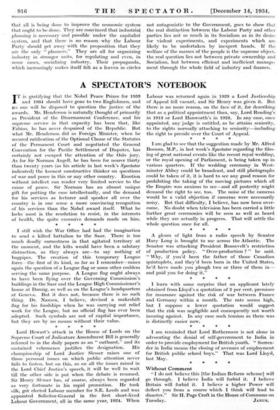A SPECTATOR'S NOTEBOOK
IT is gratifying that the Nobel Peace Prizes for 1933 and 1934 should have gone to two Englishmen, and no one will be disposed to question the justice of the awards. Mr. Henderson is naturally, thought of primarily as President of the Disarmament Conference, and his supreme service in that capacity has been that, like Fabius, he has never despaired of the Republic. But what Mr. Henderson did as Foreign Minister, when he secured ratification of the Optional Clause of the Statutes of the Permanent Court and negotiated the General Convention for the Pacific Settlement of Disputes, has certainly not escaped the attention of the Oslo jury. As for Sir Norman Angell, he has been for nearer thirty than twenty years (as his article in last week's Spectator indicated) the keenest constructive thinker on questions of war and peace in this or any other country. Emotion without intellect can render very limited service to the cause of peace. Sir Norman has an almost unique gift for putting the case intellectually, and the demand for his services as lecturer and speaker all over the country is in one sense a more convincing recognition of his services than the Nobel award itself. What he lacks most is the resolution to resist, in the interests of health, the quite excessive demands made on him.
* * * *







































 Previous page
Previous page